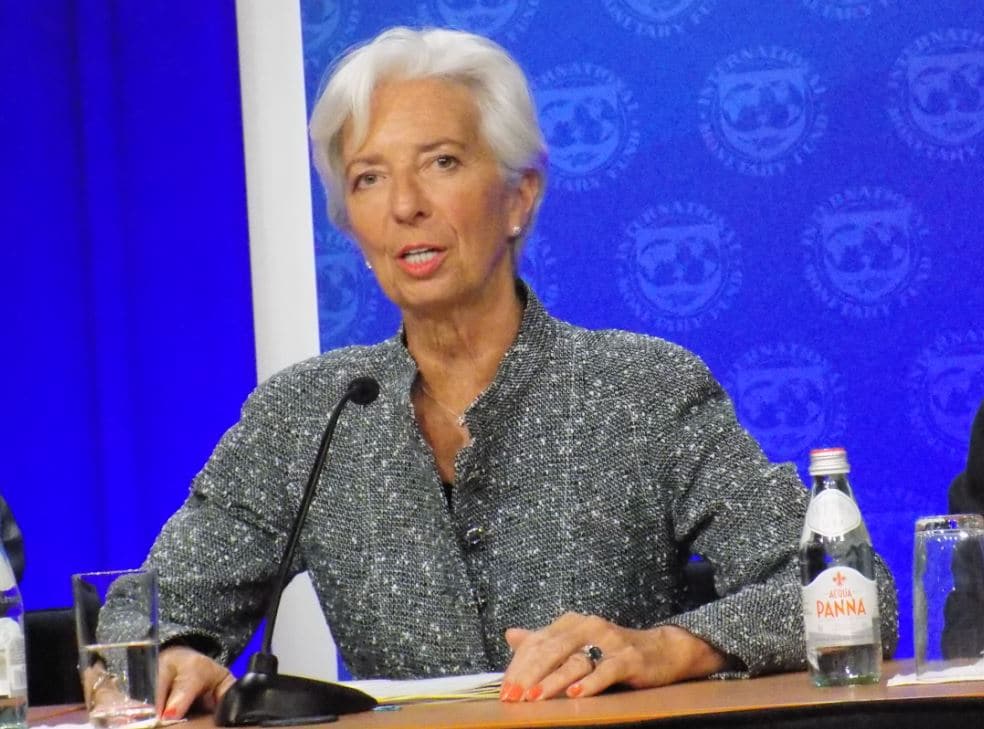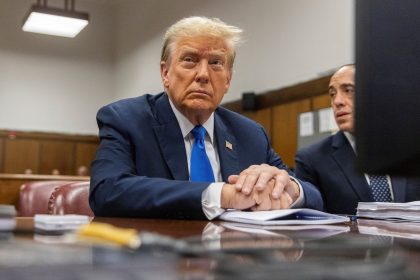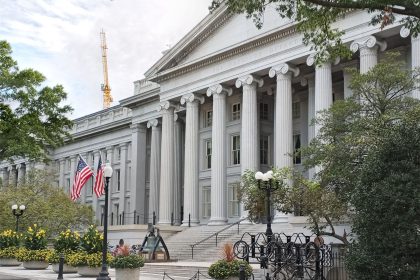Christine Lagarde Warns … ‘Nobody Wins a Trade War and Everybody Suffers’

WASHINGTON – Despite uncertainties on several fronts, including a nasty trade dispute with China, escalating tariff threats, and The federal government’s penchant for taking on enormous debt and all the risks that come with it, the U.S. economy should remain strong for the foreseeable future, the International Monetary Fund said on Thursday.
In fact, said IMF Managing Director Christine Lagarde during a Thursday news conference, when it comes to the nation’s economy, “there is a lot for Americans to be proud of.”
“In a matter of weeks, the U.S. economy will be in the longest expansion in recorded history,” she said. “This is an important achievement, driven by robust private sector demand and by policy choices that have helped spur growth and job creation.
“Unemployment is at levels not seen since the late 1960s and wages and household incomes are rising,” Lagarde continued. “And this is happening at a time when inflationary pressures in the U.S. remain very subdued.”
The session with reporters was held at the International Monetary Fund’s headquarters in Washington, D.C. to announce the preliminary findings of its annual review of the U.S. economy.
Joining the managing director on the podium were Alejandro Werner, director of the IMF’s Western Hemisphere Department; the department’s deputy director, Nigel Chalk, and its deputy division chief, Daniel Leigh, as well as Gerry Rice, the IMF’s communications director.
Lagarde said all things considered, the IMF sees the U.S. economy growing by about 2.6 percent this year — far below the 3 percent to 4 percent long forecast by the Trump administration — but an increase of the IMF’s initial 2019 growth forecast by 0.3 percentage points.
The international organization, which among other things promotes sustainable economic growth and global monetary cooperation, expects the U.S. economy to continue to grow in 2020, though at a slower, 1.9 percent rate.
But if there’s much to celebrate in the nation’s rebound from the recession that followed the 2008 global economic crisis, Lagarde went on to say the IMF is concerned that the benefits from this decade-long expansion have not been shared as widely as they could have been.
“If we look at a broad set of social indicators, we see a challenging picture,” she said, noting that income and wealth polarization have increased in recent years, social mobility has steadily eroded and while the nation’s poverty rate is falling, it remains higher than in other advanced economies.
All this while health outcomes are suboptimal and the life expectancy of the average American is trending downward.
Lagarde said the IMF would like to see the United States devote more attention to promoting inclusive growth and social outcomes more in line with the nation’s macroeconomic success.
“There are policies that can achieve this, some that already enjoy broad-based support,” she said. “[These include] instituting paid family leave, expanding the very effective Earned Income Tax Credit, and helping working families with child and dependent care.
“All of these would provide a lifeline to families and help support social mobility by making it easier for them to enter the workforce and to pursue a fulfilling career,” Lagarde said.
Market Conditions
The IMF found the nation’s financial markets have rebounded “markedly” since the turmoil they experienced in late 2018.
“This is good for near-term growth, reducing the cost and increasing access to financing,” Lagarde said.
But she went on to say the IMF remains concerned that an abrupt reversal of financial market conditions could represent a material downside risk to the United States.
“In particular, a sudden tightening of financial conditions could interact adversely with the high levels of corporate and public debt, and create a feedback loop that would also weigh on real activity and job creation. This is something to watch out for,” Lagarde warned.
“Such a shift in financial conditions would also have negative outward spillovers for corporates, sovereigns and financial institutions in other countries, particularly those with significant leverage or rollover needs in U.S. dollars,” she said.
U.S. Debt
If there’s one area of U.S. economic policy that the IMF has been consistently critical of, it’s the nation’s ever-rising public debt, a situation the organization has long called “unsustainable.”
“Policy adjustments are needed to lower the fiscal deficit and to put public debt on a gradual downward path over the medium term,” Lagarde said.
While she said a “range of possible policy options” are open to U.S. lawmakers, the IMF believes any successful package would likely require “steps to address the expected increases in entitlement spending on health and social security, to raise indirect taxes, and to institute a federal carbon tax.”
A Thumbs Up for Federal Reserve Policy
Although she spoke of policy during her brief remarks, Lagarde mentioned neither the White House or Congress. The one entity she did mention by name — and give a bit of direct praise — was the Federal Reserve, which earlier this year paused interest rate increases.
“We fully agree with that approach and believe that this will give policymakers time to gauge the balance of risks to both inflation and employment outcomes and to build a clearer picture of whether further adjustments in the federal funds rate are warranted,” she said.
“In any case, it will be important for the Federal Reserve to remain data dependent and to continue to communicate well, as it has been doing, of its assessment of evolving economic conditions and its expectations for future monetary policy,” she added.
Trade
Of course, the topic that drew many of the reporters in attendance was the ongoing trade dispute between the United States and China, and the Trump administration’s threat to impose s 5% tariff on all goods coming from Mexico unless the United States’ closet southern neighbor takes steps to staunch the flow of undocumented immigrants over its border.
Those tariffs are expected to be enacted on Monday.
The IMF’s Nigel Chalk said as far as the trade war with China is concerned, so far, the effects on the U.S. economy have been relatively mild.
“We have seen a modest headwind impacting the U.S. economy as a result of the tariffs and retaliatory tariffs enacted by the U.S. and China, but so far at least those headwinds have mostly affected particular sectors and particular states, and are not being passed on to consumers,” he explained.
“That’s not to say that won’t happen,” Chalk said. “But that kind of impact takes time to develop. We presume that so far, the increase that’s occurring in import prices as a result of the tariffs is being absorbed, somehow, in the production chain — by reductions in profit margins and perhaps some increase in the efficiencies of production.
“But that doesn’t mean the effects won’t pass through. As time goes on, you’d expect to eventually see some consumer price inflation.
As for Mexico, Alejandro Werner said while it is clear that Mexico will suffer more than the United States when the tariffs are enacted, “both countries will experience negative effects and these will be quite pronounced in certain sectors, like automobiles and transportation and agriculture, which are very integrated across the border.”
With all this as context, Lagarde said Thursday that for the global economy to function well, it needs to be able to rely on “a more open, more stable, and more transparent, rules-based international trade system.”
“As such, it will be essential that the U.S. and its trading partners work constructively together to better address distortions in the trading system,” she said, adding that it is “especially important that the trade tensions between the U.S. and its trading partners including China and Mexico … are quickly resolved through a comprehensive agreement that results in a stronger and more integrated international trading system. “
The alternative, she said, would be a situation that threatens the global economic outlook and has “negative spillovers to other countries.”
“As I’ve said before,” Lagarde said before leaving for a meeting of G-20 leaders in Japan, “nobody wins a trade war … and everybody suffers”























